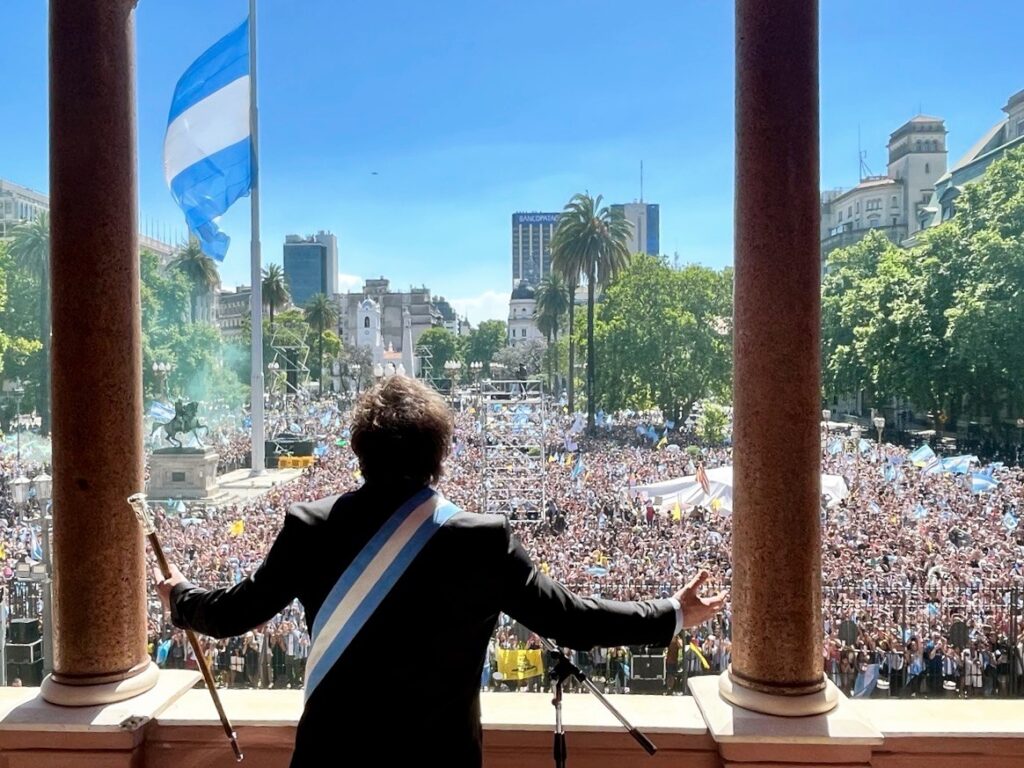
The President of the Argentine Republic Javier Milei speaks for the first time to all Argentines from the balcony of the Casa Rosada. December 10, 2023. Photo courtesy of the Office of the President of Argentina.
Argentina’s new president, Javier Milei, has promised to move the country off its hyperinflationary currency, the Argentine peso, and onto the U.S. dollar. While that seems like an obvious improvement, James A. Dorn of the Cato Institute notes that it may not be a permanent solution. As Dorn explains, the dollar is still a fiat currency managed by a central bank subject to some level of political influence. He concludes:
The root cause of Argentina’s hyperinflation is excess money growth brought about by the central bank’s accommodation of fiscal profligacy. In effect, politicians have captured the central bank for their own benefit while others bear the cost of higher inflation. Provincial governments spend freely and run deficits knowing that the Central Bank of the Argentine Republic (BCRA) will finance them. The same is true of the federal government.
In response to COVID-19, President Alberto Fernández dramatically increased spending. As a result, the year‐over‐year money supply growth increased nearly 50 percent during the first half of 2020. To counter the inflationary impact of the stimulus spending, the BCRA established the Leliq facility that drained liquidity from the financial system by selling short‐term securities into the market. The problem, however, is that as the Leliqs matured, the BCRA had to either raise interest rates to encourage banks to buy more of them or print pesos to redeem them and face even higher inflation. The BCRA did both, as Walter Bianchi reported for Reuters in July 2020. President Milei recognizes the inflation risk the Leliq system poses, and his minister of economy, Luis Caputo, is addressing it.
With inflation skyrocketing, it has become embedded in the public psyche. The widespread expectation of future inflation has destroyed any credibility the BCRA may have had. Consequently, the demand for pesos has fallen sharply, which is to say monetary velocity has increased, further increasing the rate of inflation. That is why Milei wants to abolish the central bank and dollarize the economy.
Main Lesson from the Crisis: Money Matters
The main lesson from the Argentine experience is that money matters in determining the price level and its path. Under a fiat money regime, a purely discretionary central bank—subject to political pressure to monetize government debt—is likely to inflate and thereby erode the purchasing power of money. While short‐run changes in the price level can be caused by supply‐side shocks, the long‐run value of money is primarily determined by changes in the demand for and supply of money. Only by keeping the supply of money in line with demand for cash balances can the central bank achieve long‐run price stability and retain public trust in the currency.
Milei’s Dollarization Proposal: A Caveat
President Milei’s call for dollarization to anchor the peso means putting Argentine monetary policy in the hands of the US Federal Reserve. However, the Fed also operates under a fiat money standard and lacks a monetary rule to guide its behavior. Of course, the US dollar is a trusted reserve currency, and there is a credible line between fiscal and monetary policy, but that line is still open to political manipulation. The US government faces large and growing deficits, with an increasing risk of being monetized. So while replacing the peso with the dollar makes sense, it does not remove the threat of future inflation—albeit in single rather than triple digits.
In conclusion, both Argentina and the United States need fiscal rectitude and a rules‐based monetary policy aimed at long‐run price stability. Debunking the myth that money is immaterial in determining inflation is the first step toward a more rational monetary policy.
Read more here.
If you’re willing to fight for Main Street America, click here to sign up for the Richardcyoung.com free weekly email.





